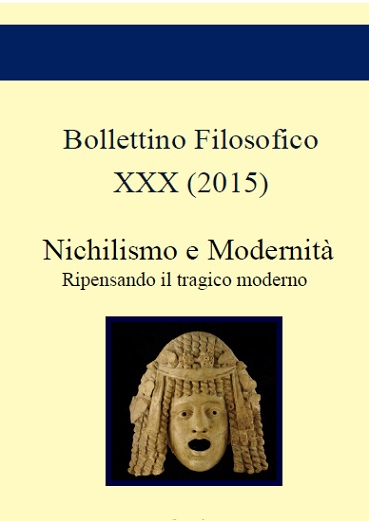Per una topografia del nihil
Abstract
In the present essay I will focus on the well-known notion of nihilism elaborated in Nietzsche’s thought, through the critical reading stated by Martin Heidegger in the first half of 20th century. According to Heidegger, Nietzsche’s analysis of nihilism – what represents, in his thought, a sort of pars destruens – cannot be overtaken by the main outlines of his purposed pars construens, i.e. the reassessment of moral values, the will to power, the eternal return, the over-man. What is at stake is the relationship between the being and the nothing, a relationship that, according to Heidegger, Nietzsche had dodged stating that the being is the will of power, and then it cannot be nothing. What Heidegger rejects of that syllogism is the separation between the being and the nothing: this latter is not opposed to the being, but, on the contrary, it belongs to the being, as the deepest meaning of the being itself, what the metaphysical tradition had removed. After Heidegger, the essence of nihilism is the metaphysics: thus, Nietzsche’s thought should be wrapped within the same categories he had would overtake.
Downloads
Bollettino Filosofico pubblica in internet, ad accesso aperto, con licenza:
|
|
CCPL Creative Commons Attribution |
L'autore conserva il copyright sul suo contributo, consentendo tuttavia a chiunque "di riprodurre, distribuire, comunicare al pubblico, esporre in pubblico, rappresentare, eseguire e recitare l'opera", purché siano correttamente citati l'autore e il titolo della rivista. L’autore, al momento della proposta di pubblicazione, è inoltre tenuto a dichiarare che il contenuto e l’organizzazione dell’opera è originale e non compromette in alcun modo i diritti di terzi, né gli obblighi connessi alla salvaguardia di diritti morali ed economici di altri autori o di altri aventi diritto, sia per testi, immagini, foto, tabelle, sia per altre parti di cui il contributo può essere composto. L’autore dichiara altresì di essere a conoscenza delle sanzioni previste dal codice penale e dalle leggi speciali per l’ipotesi di falsità in atti ed uso di atti falsi, e che pertanto Bollettino Filosofico è esente da qualsiasi responsabilità di qualsivoglia natura, civile, amministrativa o penale, e sarà dall'autore tenuta indenne da qualsiasi richiesta o rivendicazione da parte di terzi.
